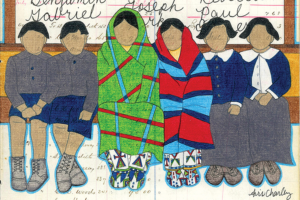 Today there are an estimated 370 million indigenous people in the world, living across 90 countries, representing 5,000 different cultures. In the U.S. there were 367 boarding schools that existed in 29 states to assimilate Native children. It is estimated that by 1926, 83% of all American Indian children had spent time at a Bureau of Indian Affairs school. Currently, over six thousand children have been unearthed from mass burial graves in North America. Today is a day to honor those who survived, and remember those who never returned home.
Today there are an estimated 370 million indigenous people in the world, living across 90 countries, representing 5,000 different cultures. In the U.S. there were 367 boarding schools that existed in 29 states to assimilate Native children. It is estimated that by 1926, 83% of all American Indian children had spent time at a Bureau of Indian Affairs school. Currently, over six thousand children have been unearthed from mass burial graves in North America. Today is a day to honor those who survived, and remember those who never returned home.
As we come together in respect and reverence today for Indigenous People’s Day, to honor a shared truth of the events of the past, today is just the beginning. It’s time for truth, for learning and sharing Boarding school histories, and acknowledging the ways that the legacies affect the present.
It’s time for healing – for addressing the spiritual, emotional, mental, and physical wounds created by colonizing systems. It’s time for justice – for advocacy, accountability, and action.
Today, it is important to acknowledge how native communities and activists have been leading the movement to see a more accurate history taught and acknowledged. Since most U.S. public school curricula standards end their study of Native history before the 1900s, the importance of celebrating the survival and contemporary achievements and challenges of Indigenous communities is crucial.
Below are some resources to learn more about the importance of Indigenous Peoples Day, the traumatic legacy of native boarding schools, and the rich spiritual history as well as ways to get involved and honor native legacies.
Read:
- What Is Indigenous Peoples Day? History
- Why More People Are Celebrating Indigenous Peoples Day PBS
- The Traumatic Legacy of Indigenous Boarding Schools The Atlantic
- Reckoning with the Theft of Native Children VOX
Listen:
- Lesson of the Day: The Forgotten History of Indigenous Boarding Schools: In this lesson, you will learn more about residential schools for Native American children, hear from survivors, and consider the importance of history, memory, and justice.
- This Land: An easily accessible primer on the history of land theft in Native America.
- Heart2Heart Livestream Series: In the Heart2Heart exclusive live stream series, the Society Fellows shared what was on their hearts and minds, critical issues, and some inspiring music.
- The Red Nation Podcast: Learn how young Indigenous people think about the world around them
Watch:
- Original Instructions: As explained by Sarah Eagle Heart
- Savage: A Residential School Musical
- 2021 Religious Diversity Leadership Summit keynote by Sarah Eagle Heart: Sarah is an Emmy award-winning social justice storyteller, activist, media strategist, and producer focused on advocacy for Indigenous Peoples. She is an internationally accomplished executive with a diverse background in tribal, corporate, and non-profit sectors, and has worked with celebrities such as John Legend, Anne Hathaway, and Mark Ruffalo. She currently serves as Co-founder/Co-CEO of Return to the Heart Foundation and previously served as CEO of the national nonprofit Native Americans in Philanthropy.
- Schools Tried to Forcibly Assimilate Indigenous Kids. Can the U.S. Make Amends? PBS NewsHour
Act:
- Indigenous Peoples’ Day NYC: You do not need to be in NYC to participate in these actions!
- Youth in Action: Black-Indigenous Youth Advancing Social Justice: National Museum of the American Indian
- Indigenous People’s Festival: Indigenous People Festival is a free, annual celebration of Indigenous creativity and brilliance where all attendees can learn about Indigenous cultures from a lineup of contemporary talent. This year, we’ll present four exciting days of virtual performances and panels featuring locally and nationally recognized Indigenous artists and advocates.
- Indigenous People’s Day Learn Series: This session will include an overview of multiple topics focused on Native communities. This includes Cultural Appropriation, intergenerational trauma, and the Boarding School system, in addition to continued systemic oppression and the epidemic of Missing and Murdered Indigenous Women. We will talk about some of the misconceptions of “Native culture” as a pan-indigenous culture, and how different each nation truly is.
Indigenous People’s Day is a reminder of existence. Let the awareness be present every day.
In solidarity,
Rev. Mark Fowler
CEO, Tanenbaum